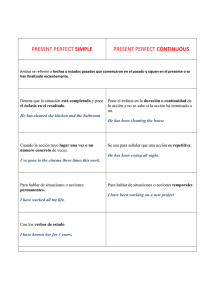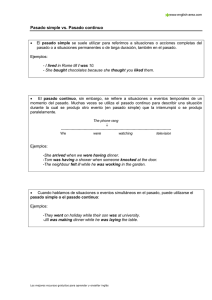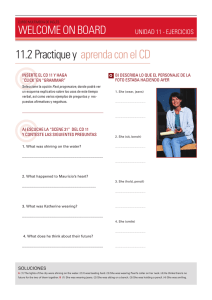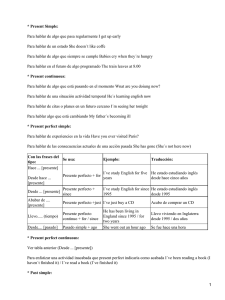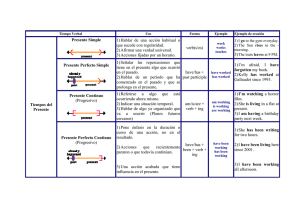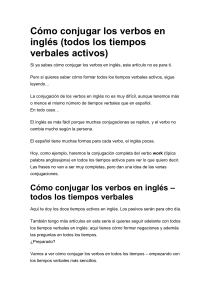verb tenses ( theory)
Anuncio
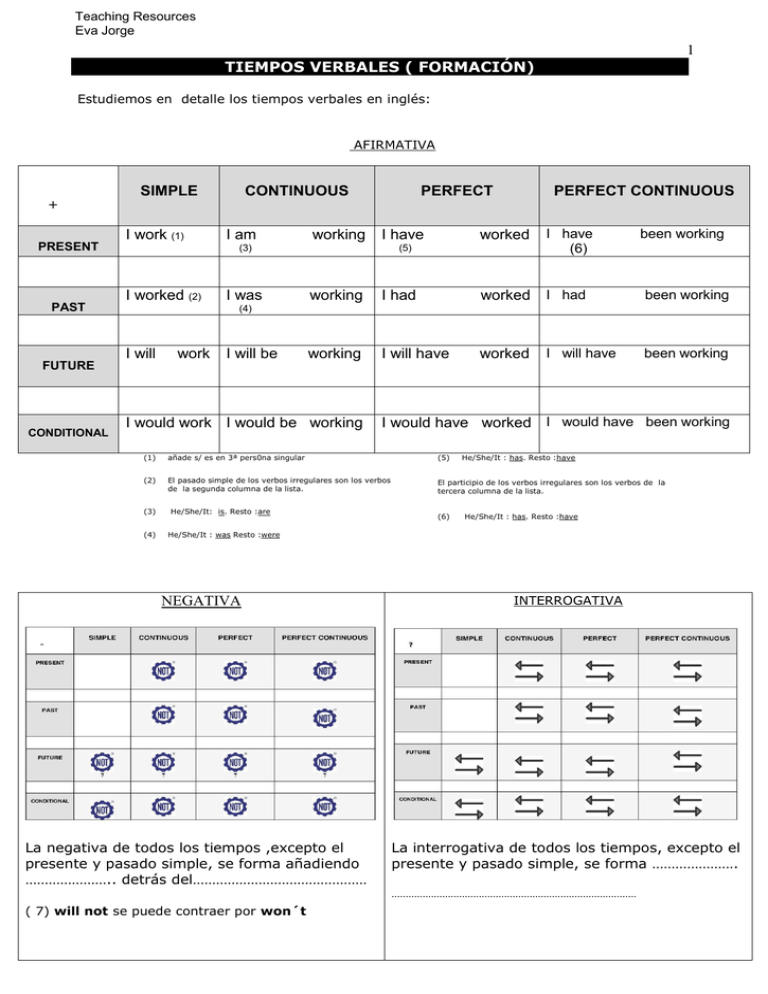
Teaching Resources Eva Jorge 1 TIEMPOS VERBALES ( FORMACIÓN) Estudiemos en detalle los tiempos verbales en inglés: AFIRMATIVA + PRESENT PAST FUTURE CONDITIONAL SIMPLE I work (1) CONTINUOUS I am working PERFECT I have (3) I worked (2) I was PERFECT CONTINUOUS worked I have (6) (5) been working working I had worked I had been working working I will have worked I will have been working (4) I will work I will be I would work I would be working I would have worked I would have been working (1) añade s/ es en 3ª pers0na singular (5) (2) El pasado simple de los verbos irregulares son los verbos de la segunda columna de la lista. El participio de los verbos irregulares son los verbos de la tercera columna de la lista. (3) (4) He/She/It: is. Resto :are (6) He/She/It : has. Resto :have He/She/It : has. Resto :have He/She/It : was Resto :were NEGATIVA La negativa de todos los tiempos ,excepto el presente y pasado simple, se forma añadiendo ………………….. detrás del……………………………………… INTERROGATIVA La interrogativa de todos los tiempos, excepto el presente y pasado simple, se forma …………………. …………………………………………………………………………… ( 7) will not se puede contraer por won´t 2 TIEMPOS VERBALES ( USO) 1 Acción rutinaria: I go to school every day PRESENT SIMPLE ONCE A day/week/month ( una vez a …) EVERY day/week/month ( cada …) IN THE morning/afternoon AT night ( por la …) 2 Situación permanente My grandmother lives in the south of Spain 3 Hechos, verdades generales y afirmaciones científicamente probadas The earth rotates around the sun 4 Horarios y programas The news start at 9 1 Acción están ocurriendo en el momento de hablar: She is singing an old song PRESENT CONTINUOUS ALWAYS/FREQUENTLY/USUALLY ( normalmente)/OFTEN ( a menudo)/SOMETIMES/RARELY ( rara vez) /SELDOM ( pocas veces)/NEVER * *Se colocan delante de todos los verbos excepto con el verbo to be que van detrás. She usually visits her aunt on Fridays. I am always at home at midnight. NOW/ AT THE MOMENT/ AT PRESENT 2 Acciones prolongadas que empezaron hace algún tiempo y que todavía están en proceso More and more people are begging 8 pidiendo) next to( al lado de) the subway station. NEXT week/month 3 Acción futura concertada (con alguien) actividades planeadas o agendadas. I am meeting her in the library tomorrow at 10 am 4 Para indicar acciones repetidas y monótonas He is always criticising her ( siempre la está ciriticando) PAST SIMPLE 1 Hablar de acciones pasadas que tuvieron lugar en un momento determinado ( acompañado de expresiones de tiempo) Yesterday, I ate chicken for dinne Janine graduated in 1999 We got married three months ago 2 Varias acciones ocurrieron consecutivamente en el pasado. Yesterday I woke up, put my clothes on, ran out of the house and took a taxi to go to work YESTERDAY LAST week/ month/year Two days AGO ( hace …) IN 1990 ON September 11 WHEN … THEN ( entonces) 3 "USED TO" + VERB 1 Acción habitual en el pasado ( solía+infinitivo) I used to sing when I was younger Expresión temporal en pasado 1 Describir una actividad que ocurría en un AT 9 oclock LAST NIGHT momento específico del pasado. At 6 o´clock I was working in the garden. PAST CONTINUOUS 2 Describir una actividad interrumpida por WHEN ... una acción más corta I was eating when you called." "We were finishing the test when the fire alarm went off 1 Dos acciones simultáneas en el pasado WHILE/ AS ...( mientras) I was dusting the chairs while my brother was vacuuming the carpet 2 Descripciones en el pasado Is was getting dark. The wind was blowing and the stars were shining.( Tb. Es posible utilizar el Pto. Imperfecto oscurecía…soplaba…brillaba ) 3 Acciones pasadas repetidas y monótonas que nos desagradaban He was always complaining about her Siempre se estaba quejando/se quejaba de ella ( tb. Es posible utilizar el Pto. Imperfecto) 1 Acción que ocurre en el pasado sin especificar el momento en que sucedió(porque no se sabe porque esa información no es importante: They have finished the lesson I´ve met your mum in the supermarket PRESENT PERFECT SIMPLE 2 Acción que empezó en el pasado pero todavía tiene continuidad en el presente. Por eso se suele traducir por presente en castellano. I haven´t done much today They have lived here since they got married. ( Viven aquí desde que se casaron) 3 Con el adverbio JUST se expresan acciones que acaban de ocurrir. We´ve just come from London Acabamos de regresar de Londres PRESENT PERFECT CONTINUOUS 1 Para hablar de acciones prolongadas que empezaron hace algún tiempo y que todavía continúan. Se suele traducir por LLEVAR+GERUNDIO I have been studying for hours TODAY THIS week/month/year HOW LONG ...? ( ¿ Cuánto tiempo? FOR ( durante y desde hace) He has lived in this city for two years. SINCE ( desde) He has lived here since 2009 EVER ( alguna vez en ?) Have you ever seen an accident? NEVER ( nunca en +) He has never drunk alcohol. JUST ( Ababar de + infinitive) She has just phoned you ALREADY ( ya en oraciones + Se coloca entre auxilar y participio) I have already seen this film YET ( ya en oraciones - ? se coloca al final de la frase) I haven´t studied french yet Has she bought the house yet? SO FAR ( hasta el momento) I have written 3 e-mails so far. RECENTLY ( recientemente) I have seen you a lot recently FOR SINCE ALL day/mornng 2 Para hablar de una acción recién terminada cuyos efectos se ven en el presente. I am very tired. I ´ve been driving all night. PAST PERFECT SIMPLE 1 Acción que ocurrió antes de otra acción pasada: By the time I got home yesterday, my parents had gone. ALREADY BY THE TIME ( en el momento en que) AFTER ( después de que …) BEFORE (antes de que) 4 Before he was 22, he had finished his studies PAST PERFECT CONTNUOUS FUTURE SIMPLE BE GOING TO + VERB 1 Igual que el anterior, pero cuando queremos enfatizar que la primera acción es de crácter prolongado We had been travelling for days when it started snowing FOR SINCE ALL day/morning 1 Expresar predicción de futuro: It will raintomorrow 2 Hacer Promesas: I promise I will do it tomorrow 3 Expresar Esperanza, deseo: I hope they will come soon 4 Hacer un ofrecimiento I ´ll do it for you 5 En las oraciones condicionales del primer tipo: I will go out if I have time TOMORROW NEXT week/ month ( el-la próximo-a … IN THE FUTURE IN an hour/two weeks ( dentro de ) LATER ( más tarde) SOON (pronto) 1 Expresar intenciones : I am going to study this evening 2 Hablar de planes A famous architect is going to build a new museum 3 Cuando queremos decir que algo va a suceder en un un futuro cercano porque se ven claros indicios de ellokl It is going to rain soon - there are a lot of clouds She is going to have a baby BY THIS TIME NEXT WEEK ( antes de /a esta hora la próxima semana) BY TEN O´CLOCK ( antes de / a...) 1 Para indicar que una acción habrá terminado en BY THEN ( entonces) un momento concreto del futuro FUTURE PERFECT We will have started the exam by ten o´clock
